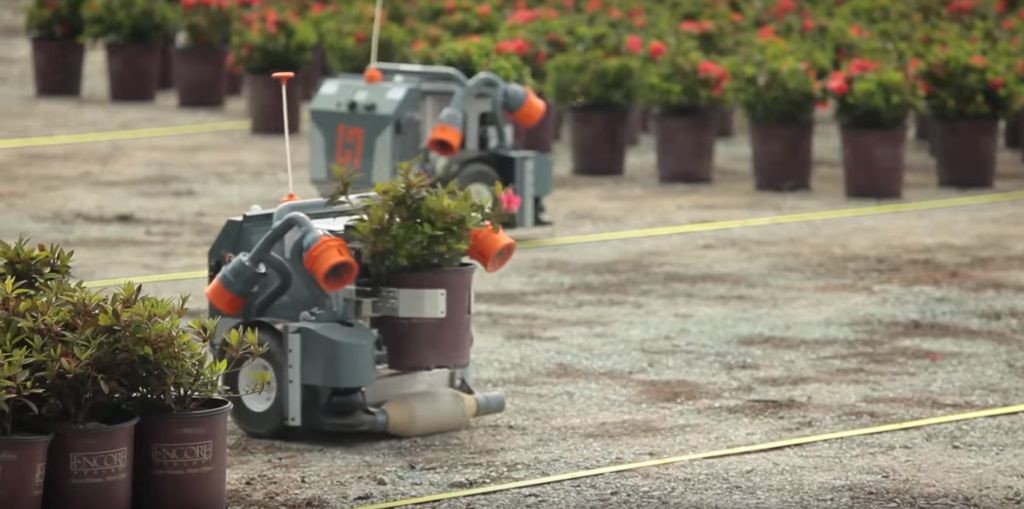
Robohub.org
What happens when a robot company sells off a division?

Spin-offs are disrupting, but often necessary. Here are two recent examples: iRobot sold off its Defense & Security Business Unit to a private equity firm, and Harvest Automation sold the IP and work in process of its warehousing robot group to a new venture-backed startup.
iRobot sells Defense & Security Business Unit to Arlington Partners
iRobot’s Defense & Security Business Unit, according to their annual report, averaged $50 million in sales for three years in a row (2013, 2014 and 2015) while home robots rose from $428 million to $560 million during the same period. The defense unit had difficulty as the wars ended in Iraq and Afghanistan and the DoD and DARPA reduced spending. Simultaneously iRobot was being hounded by activist shareholders to rid itself of the unit so that it could focus on the consumer market. This led to a heated proxy fight about adding activist board members. iRobot won that fight but also announced that it had changed its strategy and decided not to pursue DoD funded research.
iRobot appears to be going about ridding itself of non-consumer products and services. In February 2016, iRobot reached a deal with Arlington Capital Partners, a DC-based private equity firm focused on DoD and government vendors, to sell the unit to Arlington for $45 million. The deal was concluded in April when Arlington established a new company, Endeavor Robotics, manned by the 100-person iRobot staff and Defense Unit executives, and housed in the same but separate facilities adjacent to iRobot.
Less publicized but similarly focused on getting the company 100% into the consumer market was the announcement by iRobot that they were planning to “end our remaining Remote Presence marketing and business development initiatives. As we reported on our Q4 2015 call, we had already reallocated R&D resources, from a next generation Remote Presence platform, to consumer opportunities. Going forward, 100% of the company’s resources will be exclusively focused on the consumer.” Their Remote Presence Unit consisted of the AVA line of mobile robots and their joint ventures with InTouch Health and Cisco. When I asked what this meant, iRobot responded:
“During the second quarter, iRobot made the decision to end its remaining Remote Presence marketing and business development initiatives – ending the productizing of Ava 500. While iRobot believes that there is a future in remote presence, the Ava 500 market didn’t develop fast enough to justify sustaining the ongoing investment. As iRobot previously reported on its Q4 2015 investor call in February, the company had already reallocated Remote Presence R&D resources, from a next generation Remote Presence platform, to consumer opportunities.
As iRobot’s greatest opportunities currently lie in developing robotic solutions for the home, the company must put its focus toward this effort to reach its full potential. Going forward, 100% of the company’s resources will be exclusively focused on the consumer market.”
Through its venture unit, iRobot has invested in 6 River Systems, a startup attempting to provide a warehousing solution to the problems caused by Kiva Systems and their novel goods-to-man mobile robot system taken in-house by Amazon and becoming unavailable to all others. That iRobot investment, plus their forthcoming robotic lawnmower, and their new arrangement with Amazon Cloud Services, which may enable connected home access for iRobot products, all offer new commercial opportunities for growth. Also, their new Shanghai facility and Asian e-commerce operation are coming online and they have high hopes for both of those activities.
Endeavor Robotics
“Our team is developing innovative new technology that will propel our growth, as well as actively reviewing acquisition opportunities that will continue to position Endeavor Robotics as an industry leader. The U.S. Department of Defense is planning at least three major ground robot program acquisitions in the next few years. Based on our combat-proven platforms and leading technology, Endeavor Robotics is well-positioned for all three. We anticipate substantial growth over the next several years, both domestically and with our international customers,” said Tom Frost, President of Endeavor Robotics.
“As an independent company dedicated to tactical robotics, Endeavor Robotics will have new flexibility to meet the needs and protect the lives of our customers serving on the frontline and in dangerous environments. We’ve always done our best work when we worked closely with our customers. Our new structure enables us to double down on that strategy. We believe that the future is in open architecture and collaborative solutions and we look forward to making that a reality.”
Shortly after the transfer and their opening vision statements, Endeavor announced two strategic partnerships with RE2 Robotics and Persistent Systems. Both arrangements appear to be geared toward winning the DoD’s three upcoming ground robot proposals.
- The former deal is to integrate RE2’s manipulator with Endeavor’s robots. “The direct benefit of IOP compliant payloads is that it enables developers to concentrate on their specific areas of expertise. The state of the art manipulation technology that RE2 develops can be easily integrated on Endeavor’s robotic platforms, quickly getting the best capabilities to the warfighter,” stated Jorgen Pedersen, president and CEO of RE2 Robotics.
- The latter integrates Persistent’s MPU5 radios into Endeavor’s robots. Persistent Systems’ Wave Relay MANET technology, enables operators of Endeavor robots to Increase operational range in urban areas and other radio-challenged environments, by providing operators and supporting personnel views of real-time video and telemetry feeds from all robots within the MANET, and enabling a more secure network to protect information through advanced cyber-security protocols.
Although Endeavor hasn’t announced any new contracts thus far, there was a year’s worth of existing DoD contracts transferred with the sale/spin-off plus they have Arlington Capital to help with funding.
Harvest Automation sells assets, prototypes and IP to NextShift Robotics
Throughout 2015, for a year and a half, Harvest Automation split their energies between their business in agricultural field robots that transported and positioned potted plants, and a new, flexible material handling robot, in a new and separate work division. The new robot would work in factories, warehouses and distribution centers. The results of this new division’s efforts were uncertain, optimistic, and costly. During those 18 months the ag business went dormant and key people left. Joe Jones, one of the founders and CTO, left to lead a startup developing a robotic weeding device for home gardens. Others joined Harvest to help transition the single-purpose field robot with a limited skill set into a multi-purpose, self-navigating, material handling robot in an even bigger warehousing pick-and-transport system. MaryEllen Sparrow came with a background in warehousing and distribution center software to head up the software development team.
Funding got hard because the transition was taking longer and costing more than expected and their first product demonstrations left much to be desired. Although the agricultural side of the business, headed by Charlie Grinnell, was self-sufficient, it didn’t generate enough money to fund the warehousing robot project, and the company, in order to stay afloat and preserve the ag business, decided to sell off the assets, intellectual property and prototypes for the material handling operation for an undisclosed amount a few angel investors including Sparrow.
Harvest Automation and its now-strictly ag business is attempting to recover from being inactive for so long, and is also developing new ag services such as helping pickers by moving their harvested items to the packing station and bringing them containers. Harvest Automation is hoping to expand its target audience from nurseries to vegetable and fruit growers.
NextShift Robotics
NextShift Robotics is the entity created by the angel investors that acquired the IP and prototypes. MaryEllen Sparrow became the CEO. She and a very small team are working to get their new robots to be able to take a tote and transport it from point to point as directed by an elaborate warehouse management and ordering system. This involves improving their method of navigation, their approach to getting goods onto the robot’s carrying platform, and the warehouse management and ordering system control and integration software.
NextShift expects to trial their new creation later this year at a couple of pilot warehouse locations.
tags: c-Business-Finance, Frank Tobe, iRobot, The Robot Report




